#on storytelling
Text
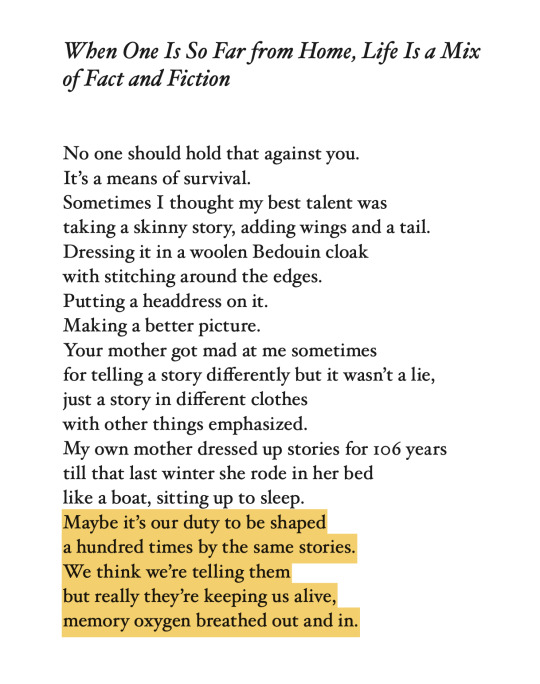
from "11 POEMS—TITLES BY AZIZ SHIHAB—FROM HIS NOTEBOOKS" as featured in Naomi Shihab Nye's Transfer: Poems
#aziz shihab#naomi shihab nye#when one is so far from home life is a mix of fact and fiction#words#poetry#typography#on storytelling#palestinian literature
2K notes
·
View notes
Text
on storytelling and repetition
“...the secret of the Great Stories is that they have no secrets. The Great Stories are the ones you have heard and want to hear again. The ones you can enter anywhere and inhabit comfortably. They don’t deceive you with thrills and trick endings. They don’t surprise you with the unforeseen. They are as familiar as the house you live in. Or the smell of your lover’s skin. You know how they end, yet you listen as though you don’t. In the way that although you know that one day you will die, you live as though you won’t. In the Great Stories you know who lives, who dies, who finds love, who doesn’t. And yet you want to know again.”
— Arundhati Roy on Indian mythology and folklore, in God of Small Things (1997)
“It was only once – once – that an audience went to see Romeo and Juliet, and hoped they might live happily ever after. You can bet that the word soon went around the playhouses: they don’t get out of that tomb alive. But every time it’s been played, every night, every show, we stand with Romeo at the Capulets’ monument. We know: when he breaks into the tomb, he will see Juliet asleep, and believe she is dead. We know he will be dead himself before he knows better. But every time, we are on the edge of our seats, holding out our knowledge like a present we can’t give him.”
— Hilary Mantel on Shakespeare’s Romeo and Juliet, in “Can These Bones Live?”, Reith Lecture, 2017
“So what makes this poem mnemonic is not just repetition. Rather, it’s the fact that with repetition, the repeated phrase grows more and more questionable. I’ve remembered “Come on now, boys” because, with every new repetition, it seems to offer more exasperation than encouragement, more doubt than assertion. I remembered this refrain because it kept me wondering about what it meant, which is to say, it kept me wondering about the kind of future it predicted. What is mnemonic about this repetition is not the reader’s ability to remember it, but that the phrase itself remembers something about the people it addresses; it remembers violence. Repetition, then, is not only a demonstration of something that keeps recurring: an endless supply of new generations of cruel boys with sweaty fists. It is also about our inability to stop this repetition: the established cycles of repetition are like spells and there’s no anti-spell to stop them from happening. The more we repeat, the less power we have over the words and the more power the words have over us. Poetic repetition is about the potency of language and the impotence of its speakers. In our care, language is futile and change is impossible.”
— Valzhyna Mort on Russian poet Yevgeny Yevtushenko, in “FACE – FACE – FACE: A Poet Under the Spell of Loss”, The Poetry Society Annual Lecture, 2021
#web weaving#quote compilation#shakespeare#romeo and juliet#Hilary Mantel#arundhati roy#valzhyna mort#excerpt#on poetry#on storytelling#god of small things
3K notes
·
View notes
Text

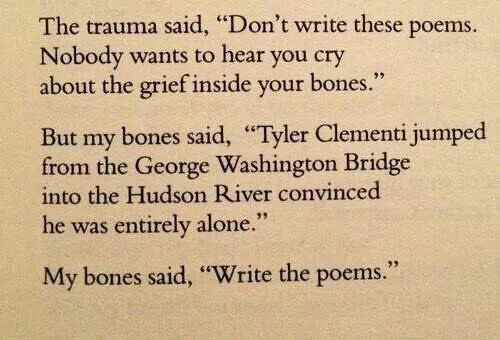



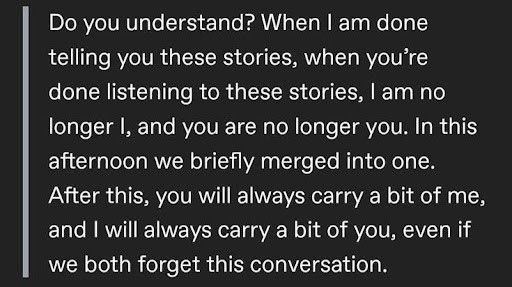





on the value of storytelling;
Into the Water - Paula Hawkins // The Nutritionist - Andrea Gibson // LIFE Magazine 1963 - James Baldwin // Anti-depressants are so not a big deal - Crazy Ex-Girlfriend // Nobel Prize Acceptance Speech 2017 - Kazuo Ishiguro // Invisible Planets - Hao Jingfang (tr. Ken Liu) // tumblr user @/poseidonsarmoury // Road to Hell (Reprise) - Hadestown // Letters to Milena - Franz Kafka // The Catcher in the Rye - J.D. Salinger // Exandria Unlimited: Calamity - Brennan Lee Mulligan
181 notes
·
View notes
Text
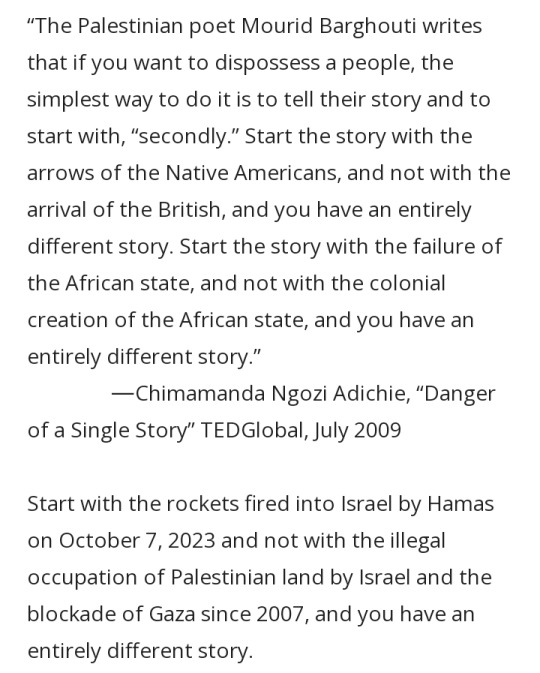
— Harvard Divinity School, Statement from the Leadership of Religion and Public Life on the Current Spate of Violence in Palestine/Israel
80 notes
·
View notes
Photo

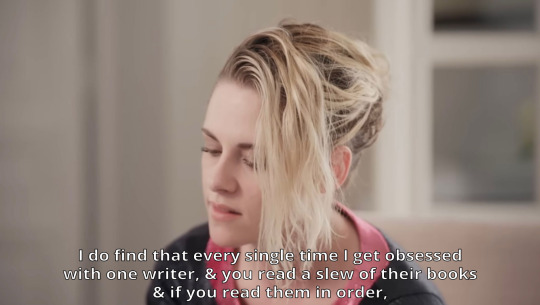
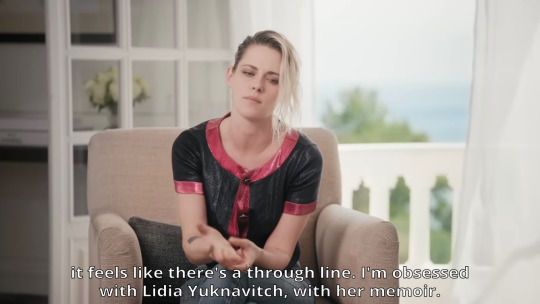

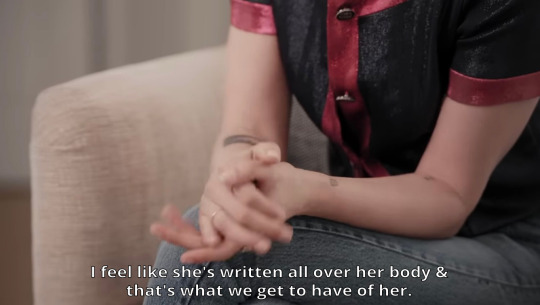
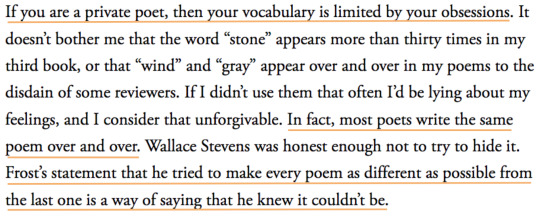
jeffrey levine / kristen stewart / richard hugo
#on storytelling#jeffrey levine#kristen stewart#richard hugo#the kristen stewart video is sooo good i love listening to people talk about books#compilation
316 notes
·
View notes
Note
Hii tamelee! If I remember correctly, you’re studying storytelling, is that right? I wondered if you could explain in details what kind of school you’re going, or just what exactly you are doing in your studies? If it’s okay with you of course 😊
Have a good day :)
Hi~! Yeah, sure!
I did marketing, (communication and entertainment), but then finished audiovisual and graphic design because I liked that much better than learning about how manipulative the industries are tbh. Unfortunately, I found out quickly, that pretty much every job in that industry has been taken over by AI and that even me learning how to draw wasn’t going to help me with that anymore either 🥲. Then, I continued doing Storytelling in the communication sector (where, yet again I learned about all the ways people are being manipulated -.-) because it’s quite a new official study. And then, I was accepted to apply for the program that focusses more on fiction— and got in.
Which I’m doing right now (though I’m almost done).
In short, what I learned about Storytelling in business is that organizations use the elements of fictional storytelling combined with science (both internally and externally) in order to influence and convince the attitude, knowledge and behavioral patterns for the right audiences that are targeted by a certain communication goal. That goes so far that even the science about our brains are dissected to figure out the best ways in which the organization can redirect your neurotransmitters and hormones to benefit the storyteller. Even if you know you’re being manipulated, (for example, through a commercial that’s shamelessly stomping on your morals through a guilt-trip, or a product in the store that’s obnoxiously being shoved in front of you), often it’s still about targeting your subconscious and trust me when I say that if you enjoy spending time on the internet, it happens to you all the time and you don’t even know it :D
And yes, companies like shueisha/VIZ are masters in this as well— hence me disappointingly complimenting that skill at times.
So, imagine my joy when I crossed the bridge toward fiction.
Fictional storytelling is where I dissect not the science of a human brain exactly, but the story that’s being told. I have to figure out all the elements and literary devices that are being used and what they mean in the story. Not what it means to me, but finding meaning through the Theme the author/creator has used, and why. It’s about how a story is structured and what impacts people on an emotional level for their benefit (mostly). Why a story works and keeps you up all night, why others are usually almost always forgotten quickly. It’s not as subjective as people may think. Interpretation doesn’t mean much unless there’s intentionally room for it. (And when something is intentional or when it’s not.) There’s also science in its logic, but that’s not something most authors/creators focus on. And they really shouldn’t have to imo. It’s also knowing about character arcs and how to implement symbolism and motifs effectively. I have to write essays on movies and books or even TED talks. It’s using knowledge to figure out the why, what and how.
I think it’s awesome as a study, but other than some creative writing lessons, it won’t help me with great prose. It’s hard for me to connect with my own emotions and body which is something a lot of great authors can do really well. Either naturally or having to have practiced the connection with their personal emotional intelligence in order to write their Truth in their own authentic way through their characters. I read many books outside of my study from scriptwriters as well which were helpful. None of it is any reassurance I’ll be able to write my own story effectively though. It’s more a guideline of sorts with knowledge and structure which a neurodivergent like me (yes, I’m diagnosed officially) really needs xD. I still have to practice a lot! ^^
Hope you have a good day as well 🌷!
9 notes
·
View notes
Text
Unpopular opinion : let me struggle
Don't over explain.
Drop me in the middle of the story and let me figure it out. Don't tell me how the characters are feeling. Actually, don't tell me shit. Describe their actions and let me decide what this means for me.
I don't need to know he feels content. I do need to know he smiles. Maybe he smiles because he's happy, maybe because he's about to kill someone.
Who knows? I sure as fuck don't, which makes it EXCITING.
Don't tell me how to feel, give me the option to feel what I want.
Character A finds Character B hot? Cool, don't tell me. I'll figure it out by the way he acts. If I don't, then sucks to be me.
Nothing brings me more joy than going WHAT DOES THIS MEAAAANNNNN and the author being like "hehehe, good luck bitch".
These stories are so rare. I inhale them.
19 notes
·
View notes
Text
i love you hunting hound characters i love you characters that immediately feel like they need a leash and a muzzle on them 24/7 i love you characters who can't kiss without their canines tearing into your tongue i love you characters who can't love in sweet and soft and simple ways i love you characters that are like breath of fresh air punched out of your gut i love you characters who's innocence and kindness feels that much more meaningful because they can bite and are choosing not to i love you violent delights i love you characters whose love is dagger shaped and blood soaked
#sorry i finished a kesett fic and am remembering why i read stories in the first place#this is a love letter to boba fett#but also to anakin skywalker#feeling extremely about untamed and untamable characters i love them i love it when the reward for belonging with a wild character#isn't that you eventually get to defang and declaw them and render them helpless; it's that they willingly choose to love you#because you are worth more than their violence#on storytelling
113 notes
·
View notes
Text

Naomi Shihab Nye
#naomi shihab nye#brushing lives#words#poetry#typography#palestinian literature#on storytelling#on language#on voice
1K notes
·
View notes
Text

Posthaste Manor, Jolie Toomajan and Carson Winter
10 notes
·
View notes
Text
Someone in my life posed some interesting questions about stories recently! In considering them I figured I'd keep a record of my thoughts here on my tumblr web log, because what void should I holler into if not this one?
First, how I think about stories. I try to avoid thinking about them as morality plays or parables (mostly because this can keep me from engaging with challenging art) but I also don't like thinking about them purely as escapism. Each story has a reason it exists, whether that's entertainment, communication, or contemplation. They're designed to draw out our empathy, communicate a feeling, create a mood. Sometimes that's in service of something important to the author. Other times, it's something meant to distract. I don't judge a story based on its pretensions, or on its naked commercialism -- I try to judge based on its execution, how it's doing what it's doing, and how well it succeeds. There are great artists right now working solely with other people's licenses, doing work-for-hire gigs, and their skills are just as worthy of praise and appreciation as the latest semi-original high-concept novel hanging in the middle of the New York Times bestseller list.
Basically, I think about stories like stories! Or, if I absolutely have to be metaphorical, like buildings. Are the foundations strong? Is it doing anything special? Can I navigate it easily? How accessible is it? That last matters a lot to me, because it doesn't matter how cool the interior is if most people can't find their way inside.
Second, what do I need a story to do to recommend it to someone else? I'm gonna go with "accessibility" at the top, not in the disability sense but the populist one. Yeah, playing to the cheap seats can hurt a story a lot, and you obviously can't please everyone, but ignoring your audience doesn't make me appreciate your story much myself, let alone get me to recommend it to anyone else. You have to find a balance where what you're communicating isn't absolute nonsense to most of your audience. Not all! Just most. Effective communication of your thoughts, feelings, and ideas to a layman is something I think a lot of storytellers could stand to care about more when it comes to honing their craft, and that goes for folks outside of the arts especially. So if I find a story with a big concept, beautiful craft, intense emotion, and it's not too esoteric or inaccessibly written? That's great art in my book, and I'll tell everyone about it.
Next, what do I look for in stories? Now that is a tough one... I guess, beyond sheer execution (if your prose is good enough you can take me almost anywhere) I look for something that makes me care about its characters as it introduces me to their world, and does so without me feeling like I'm being told why I should care about the characters or what their world is like. This goes for everything from period pieces to stories set in places or communities I'm unfamiliar with, just as much as it goes for fantasy or science-fiction. I do generally have to care about the characters in a piece to really devote a significant amount of time to a story, though. If I don't, the other elements of the work (craft, originality, feeling) have to carry a whole lot more of the weight in order to get me to finish something.
What are red flags for me? Honestly, a big one is feeling either preached or condescended to. Even if it's politics or perspectives I agree with, if I feel like I'm being told what to think rather than thinking it on my own, or if I simply think the author doesn't trust me to understand what they're trying to say? I check out. Beyond that, when a story excuses terrible behavior in the interests of forcing me to sympathize with a character the author clearly favors, I also check out. There's other stuff too -- I don't much care for certain tropes when they feel obvious or sufficiently undisguised (at least try to put some kind of spin on it!) -- but those are the big ones I think. If I see those, my desire to continue drops real sharp.
A recent example of a story I really loved, because I try to stay positive: earlier this year I finished a book called A Memory Called Empire by Arkady Martine, which almost instantly became one of my favorite stories. I had to sit with my feelings for days before I really settled on that, too! I worry about recency bias sometimes, that an impact will dull with time, but Empire has lived in my head since I read it. It's a well-told and compelling yarn that dips into a number of my favorite genres (science-fiction, murder-mystery, political intrigue, thriller) told from one of my favorite POVs (first-person) that also happens to dig into concepts that I find super cool and interesting! Things like history, how it's recorded, who makes it, what matters versus what historians only think matters. Things like the colonialism, cultural imperialism, and the politics of empire -- the pressure of being a small community being subsumed by a larger, more dominant one, the complicated nature of being a person from two worlds, whether by choice or by birth, and so on. It's got a lot of thoughts about that stuff, and it can't touch on all of them with the depth that they deserve, but it knows enough to know there's no easy answer for a lot of its questions, and it manages to make that feel like a natural conclusion rather than a copout. A great novel, and one I recommend to most everyone I know!
One I'm still in the middle of that I need to get back to: Gene Wolfe's Book of the New Sun. That's a work that I think is a bit inaccessible, with characters that I don't necessarily love (the protagonist is a professional torturer, if that tells you anything) but the sheer craft on display... my god. There are whole sections I've read, passages that describe a feeling that I've had before but never put to words, and it expresses them so effectively and with such excellent language that it carries me forward on those passages even when I'm unsure what this person's quest is or whether or not I even like them. And that's to say nothing of the depth of the text itself -- Ursula K. Le Guin famously called Gene Wolfe genre fiction's Herman Melville, and that's been borne out in what I've read so far. I've been listening to the Shelved by Genre podcast as I've been reading the book, and their own insights and analysis illuminate whole sections of the text that I would never have noticed otherwise, or would have without knowing exactly why! Awesome stuff.
#moose blogs#on storytelling#i think about stories a lot#like i think about history a lot#that venn diagram is a circle in my mind#so when i find a story that thinks about the same stuff?#that's the best babyyy
10 notes
·
View notes
Text
ON MEMOIR
“The act of making something from what is already there always involves a simultaneous creation and destruction.... Even what seems like the purest, most self-contained type of creativity -- turning the events, images, and ideas of one's life into a written story --is a destroyer.”
Lisa Knopp, The Nature of Home: A Lexicon and Essays
“Truth for anyone is a very complex thing. For a writer, what you leave out says as much as those things you include. What lies beyond the margin of the text? The photographer frames the shot; writers frame their world.”
Jeanette Winterson, Why Be Happy When You Could Be Normal?
“I have never liked the memoir form because I tend to think that memory fictionalizes anyway. Once you claim that you are writing a narrative purely from memory, you are already in the realm of fiction.”
Francisco Goldman
“I tell aspiring memoirists, if you're the kind of person who can't apologize, who digs in, trusts only the first impulse, then this won't be your form. The convenient sound bites into which I store my sense of self are rarely accurate -- whose are? They have to be unpacked and pecked at warily, with unalloyed suspicion. You must testify and recant, type and delete.”
Mary Karr, New York Times Op-Ed page (01/15/2006)

Lidia Yuknavitch, The Chronology Of Water: A Memoir
“The French word from which the English “memoir” derives reflects this transformation. Mémoire, meaning “memory,” is feminine; mémoire, meaning “memoir,” is masculine. It is a change of gender, in French called genre. Truth belongs to one genre; recalled truth to another. But that does not make truth recalled a lie: It makes it a fiction in the Latin sense — of a thing fashioned — that Hadrian would have recognized. A memoir is a shape given to the chaos of a life.
Every event, and certainly every event worth writing about, will always remain tattooed on our neurons. So it is never too early to start giving those events, which are our lives, a form. It is a homage we pay ourselves. More solid than a memory, a memoir will outlast it, because until a memory is put into words, it remains mist, never shore.”
Benjamin Moser
“I don't know where the idea originated that memoir writing is cathartic. For me, it's always felt like playing my own neurosurgeon, sans anesthesia.”
Koren Zailckas
“Autobiographical storytelling can take personal experience back from silence, shame, fear, or oblivion. It says, ‘I cherish this,’ or, ‘This haunts me.’ It asserts the significance of events in one’s life: ‘This happened to me.’ ‘I did this.’ ‘This is part of who I am.’ ‘This should not or will not disappear, and I act to preserve it by turning it to words and shaping them as story.’”
Gregory Orr, Poetry as Survival
#i have been collecting these like precious stones#on storytelling#the odyssey of recollection#compilation
289 notes
·
View notes
Text
"Organizers seek to impact [...] the way people reconstruct the past, the way we understand the present, and ultimately the way we envision what could be. Creating against the grain. What stories are we telling ourselves? What are we sowing into the world as we speak?
Our politics are a part of this world-building process. And story-telling is a fight for the future. That fight is inescapable in a world on fire. The only questions are how the fight and the fire will shape us, and how we will shape the fight and the fire."
- Kelly Hayes, for the introduction of Let This Radicalize You
3 notes
·
View notes
Text
Some thoughts about storytelling and TV shows.
I'm going through a stressful time right now (for happy reasons, though!) and so I've fallen a little bit in a habit of watching random episodes of various shows I'm interested in before bed. Because I'm impatient and my brain goes a million kilometers per hour, I can't help but read IMDB pages and look at tumblr gifs, so a lot of the stuff I watched is already "spoiled" for me (in quotations marks because these are called spoilers, but they don't always stop me from watching a a show or take away from my enjoyment of it).
This post contains spoilers.
I watched Sports Night in the last two weeks because of Aaron Sorkin's writing and it made me think about how much the constraints coming for the network producing the show influence the story. The show was marketed as a comedy, even featured a laugh track in the first season, the episodes were only 20 minutes, and it didn't survive past the second season. The ratings were just not good. There are plenty of interesting themes in this show that I felt were only superficially explored and I blame it on all of the factors I listed. We didn't get a deep dive into Dan's mental health issues, because it wouldn't have been very funny. We didn't get any closure on the Dana and Casey situation, because the show ended prematurely. There was very little debate about the importance of sports and sports journalists, because the episodes were only 20 minutes, and they also had to contain jokes and relationship drama and an obligatory heartfelt monologue at the end. I'm so, so happy that Sorkin remade this idea into The Newsroom, a much more serious show, with a bigger budget, the ability to say fuck and a timeline that feels complete. It was an idea so good it was worth a second try and it paid off. It made me think about all the ideas I wasn't skilled enough to make happen, it made me think about all my past projects that deserve a second chance and it made me at peace with the concept of reusing writing that I love in new ways. Nothing is ever truly lost.
I watched a few episodes of The Good Wife because of Josh Charles and Matt Czuchry (only Matt was not enough to convince me to watch a seven season legal drama). I found them interesting, compelling, and I love they way they were filmed and colored (they remind me of Suits and The Newsroom, which both aired around the same era of television; some parallels to think about here). But I couldn't help myself and I read the IMDB page of the show, which told me Josh Charles' character dies in the middle of season 5. I watched that episode (minus epsilon, plus epsilon, which is a fun way for me of saying I also watched the episode before and after) and I liked how the story portrayed the sudden death of an important person in the characters' lives, the grief and the dissonance that come with going through a life altering event before lunch and having to continue the rest of the day among people who have no idea what just happened. It's a good piece of writing and in real life death does happen at inconvenient times, it does make you ask why over and over again with no answers to be had, so the death of a beloved character in the middle of a season is anything but unrealistic. But I couldn't help wondering. Did it really happen because the writers thought it was an important story to be told, or did it happen because Josh Charles wanted to leave the show? (I haven't gone to investigate this thought). Was the story the most important thing considered here, or was simply a contract, a real life issue, dictating the story, taking it in a different direction that was originally planned? It made me think about how fickle of a medium TV is, about all the different ways in which parts of the story have to be sacrificed. It made me think about the different ways in which writers have to adaptable, about how in TV you are sometimes forced to kill your darlings instead of it being just good advice. And it made think about the fascinating process of writing a story with the help of a community, all these different people - actors, directors, editors - contributing to the story. It's not the writer at their desk controlling everything, it's a different beast entirely, a beast with many hearts.
#on writing#writerblr#writeblr#i'm putting it in these tags because it is very much an analysis of storytelling#on storytelling#sports night#the good wife#thoughts
5 notes
·
View notes
Text
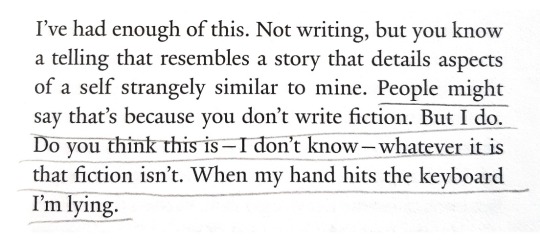
— Eileen Myles, from 'For Now (Why I Write)'
[text ID: I've had enough of this. Not writing, but you know a telling that resembles a story that details aspects of a self strangely similar to mine. People might say that's because you don't write fiction. But I do. Do you think this is — I don't know — whatever it is that fiction isn't. When my hand hits the keyboard I'm lying.]
43 notes
·
View notes